| Srl | Item |
| 1 |
ID:
163285
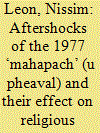

|
|
|
|
|
| Summary/Abstract |
The significance of the electoral ‘mahapach’ (upheaval) is not limited to the Likud’s rise to power in 1977 for the first time in Israel’s history. It also brought secondary upsets in the form of changes of guard among other political forces. This article focuses on three such ‘aftershocks’ which remoulded Israel’s religious political sphere: the metamorphoses in ethnic, Haredi and religious-Zionist politics. The political change of guard in each of these areas as a result of the mahapach boosted the power of religious forces, transforming them from marginal, largely reactive factors into active players with lasting impact on the moulding of Israeli society.
|
|
|
|
|
|
|
|
|
|
|
|
|
|
|
|
| 2 |
ID:
149188
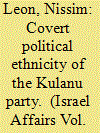

|
|
|
|
|
| Summary/Abstract |
The Israeli general elections of March 2015 saw the advent of a new middle-class party. Kulanu, headed by Moshe Kahlon, achieved 10 seats for its representatives in the Knesset (Israeli parliament). This article proposes that Kulanu be viewed not only as a middle-class party, but also as a new addition to the list of Mizrahi ethnic parties. Kulanu’s appearance on the political centre-stage in Israel rested, at least among the Jewish population, upon its ability to offer a political wavelength and series of political symbols of upwardly mobile ethnicity in Israel – first and foremost among them the elusive ethnicity of the Mizrahi middle class. Kulanu’s political ethnicity assured widespread legitimacy for its agenda as well as empathy on the part of the source of its power – the Mizrahi middle class.
|
|
|
|
|
|
|
|
|
|
|
|
|
|
|
|
| 3 |
ID:
187562
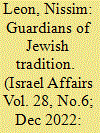

|
|
|
|
|
| Summary/Abstract |
The big drama of Israel’s four closely spaced national elections in 2019–21 was accompanied by another, smaller, drama: the country’s plunge into political chaos gave the Shas party an opportunity for electoral, organisational, and political revitalisation. The four election campaigns transformed Shas from a Mizrahi-Haredi party in decline, barely able to pass the minimum vote threshold, into a stable party practicing a tightly focused politics – living proof that Haredi politicians were again occupying positions of power and influence. Not only did Shas do outstanding organisational and political work; it also demonstrated an impressive ability to align with the Israeli right’s core national-political agenda: the connection between security and tradition. The language of the Shas message evolved from one election campaign to another: what started as a Haredi (ultra-Orthodox) discourse of cultural partnership with a religious-lite or masorti (traditionalist) public turned into a Zionist discourse of national partnership with a ‘right-lite’ voting public (Likud).
|
|
|
|
|
|
|
|
|
|
|
|
|
|
|
|
| 4 |
ID:
160942
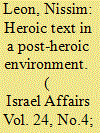

|
|
|
|
|
| Summary/Abstract |
This article seeks to address the adaptation of a heroic text (the prayer for the welfare of Israel’s soldiers) to a social environment (Mizrahi haredi society in Israel) that it critical of its content yet seeks to include the prayer in its canonical texts (in this instance, the prayer book) owing to social and political circumstances. It will argue that the accommodation can be understood within the framework of the discussion of post-heroism in civil‒military relations in Israel, whereby different groups create models or forms of heroism that either compete with or accord with the dominant (national military) model.
|
|
|
|
|
|
|
|
|
|
|
|
|
|
|
|
| 5 |
ID:
140300
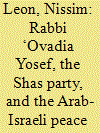

|
|
|
|
|
| Summary/Abstract |
One of the prominent religious parties in Israel, intimately involved in political decision-making, has been the Shas party, led by the late Rabbi ‘Ovadia Yosef. This article examines four components of Rabbi Yosef’s political stance: (1) his view of Jewish religious law as a factor that moderates the force of changes of seemingly historical and revolutionary significance; (2) his opposition to radical messianism; (3) his desire to adopt independent positions; and (4) his role in the development of a Mizrahi, ultra-Orthodox stream of Zionism.
|
|
|
|
|
|
|
|
|
|
|
|
|
|
|
|
| 6 |
ID:
084915
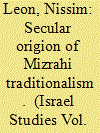

|
|
|
| 7 |
ID:
084516
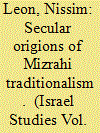

|
|
|
| 8 |
ID:
139242
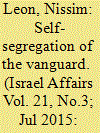

|
|
|
|
|
| Summary/Abstract |
The religious-Zionist settlement movement combines revolutionary national action with a conservative, religious way of life. On the one hand, the leaders of the religious-Zionist settlement movement see themselves as spearheading a national mission with pan-Jewish significance. On the other hand, living in the movement's communities entails a certain degree of segregation from general society. A religious-Zionist settlement is also a community-based tool for Orthodox self-defence against what is perceived by a fundamentally conservative society as different and threatening to its religious way of life and continuity. A selective religious enclave, such as the religious-Zionist settlement, which is not too distant from the centres of employment, commerce, services, and entertainment in central Israel, is also an efficient arrangement for moderating friction with secular society. In addition, Judea and Samaria provide environments for the development of a distinctive suburban lifestyle among the religious-Zionist core populations, enabling them to be part of the new Israeli middle class at a price that young couples and (usually large) religious families can afford.
|
|
|
|
|
|
|
|
|
|
|
|
|
|
|
|
| 9 |
ID:
137547
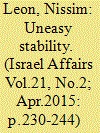

|
|
|
|
|
| Summary/Abstract |
This article examines the emergency election campaign launched by the Haredi parties in anticipation of the 2013 general elections in Israel, in order to attract the votes of those generally perceived as their automatic supporters – the Haredim. The 2013 campaign was a struggle for the ‘converted’ – the Haredi vote – amongst UTJ and Shas supporters alike. The battle was fought openly and assertively. The intensive efforts ultimately achieved what may be described as an uneasy electoral stability. The reasons for this situation, and how the Haredi parties addressed it, is the subject of this article.
|
|
|
|
|
|
|
|
|
|
|
|
|
|
|
|